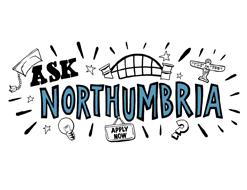-
Study
-
Quick Links
- Course Search
- Fees and Funding
- Unlock Your Potential
- Still time to Apply
- Higher and Degree Apprenticeships
- Continuing Professional Development
- Still time to apply
-
Undergraduate
- Application Guides
- UCAS Exhibitions
- Foundation Years
- School & College Outreach
- Information for Parents
-
Postgraduate
- Application Guide
- Postgraduate Research Degrees
- Flexible Learning
- Change Direction
- Register your Interest
-
-
International
International
Northumbria’s global footprint touches every continent across the world, through our global partnerships across 17 institutions in 10 countries, to our 277,000 strong alumni community and 150 recruitment partners – we prepare our students for the challenges of tomorrow. Discover more about how to join Northumbria’s global family or our partnerships.
View our Global Footprint-
Quick Links
- Course Search
- Undergraduate Study
- Postgraduate Study
- Information for Parents
- London Campus
- Northumbria Pathway
- Cost of Living
- Sign up for Information
-
International Students
- Information for Students
- International Events
- Application Guide
- Entry Requirements and Education Country Agents
- Global Offices
- English Requirements
- English Language Centre
- International student support
- Cost of Living
-
International Fees and Funding
- International Undergraduate Fees
- International Undergraduate Funding
- International Masters Fees
- International Masters Funding
- International Postgraduate Research Fees
- International Postgraduate Research Funding
-
International Partners
- Agent and Representative Network
- Global Partnerships
- Global Community
-
International Mobility
- Information for Northumbria Students
- Information for Incoming Exchange Students
-
-
Business
Business
The world is changing faster than ever before. The future is there to be won by organisations who find ways to turn today's possibilities into tomorrows competitive edge. In a connected world, collaboration can be the key to success.
More on our Business Services -
Research
Research
Northumbria is a research-rich, business-focused, professional university with a global reputation for academic quality. We conduct ground-breaking research that is responsive to the science & technology, health & well being, economic and social and arts & cultural needs for the communities
Discover more about our Research -
About Us
-
About Northumbria
- Our Strategy
- Our Staff
- Place and Partnerships
- Leadership & Governance
- Academic Departments
- University Services
- History of Northumbria
- Contact us
- Online Shop
-
-
Alumni
Alumni
Northumbria University is renowned for the calibre of its business-ready graduates. Our alumni network has over 246,000 graduates based in 178 countries worldwide in a range of sectors, our alumni are making a real impact on the world.
Our Alumni - Work For Us
What will I learn on this module?
This module provides an opportunity to undertake a sustained, large-scale writing project as the culmination of your degree. It allows you to demonstrate both creative skill and the ability to reflect critically on your creative writing practice.
You will undertake a Creative Writing Project of 8,000 words of prose fiction or 300 lines of poetry. Your creative writing project may take any form that is agreed by the project supervisor, but in most cases will be:
• A collection of poetry;
• A collection of short stories;
• A novella;
• Part of a novel
As well as the creative work, you will submit a critical commentary reflecting on the project. The commentary must be 1,000-4,000 words. The creative work will be 4,000-7,000 words, so that together they make a total of not more than 8,000 words.
As well as the final project, you will give a formatively assessed presentation, and submit summatively assessed draft work, in semester 1.
How will I learn on this module?
The module is primarily student-led, which means that you are responsible for developing, planning and carrying out your own creative project. You will read widely a selection of primary and secondary texts, develop ideas, draft and revise creative work, and reflect critically on your writing. You will attend lectures addressing key stages of the project, and small-group workshops in which you will read and comment on each other’s draft work.
At this stage in your degree you will develop independent ways of working and take ownership of your own learning and writing, and the academic support you will receive is designed to help you do that. You will attend fortnightly tutor-group seminars, a small number of lectures, and one-to-one tutorials with a project supervisor who will work with you over the course of the module. You will be supported in gaining appropriate ethical clearance for your project.
How will I be supported academically on this module?
Your main support will come from your supervisor, who will help you to develop your practice based-research in relation to your project. He or she will also help you develop your research, build a bibliography, and discuss the development of your writing. You will also have the opportunity to make a support network with other students undertaking projects through the fortnightly workshops.
Your module tutor will place PowerPoint slides from lectures and other material on Blackboard to help you support your engagement with your project and with the assignments.
Your supervisor will provide feedback on your ideas for your first piece of written assessment, and feedback on this piece will feed forward to help you develop your skills for the dissertation.
You have a designated Guidance Tutor. The academic side of the Guidance Tutor’s role includes:
• monitoring your ongoing academic progress
• helping you to develop self-reflection skills
• directing you to services which can help you with your academic skills (e.g. Library’s Skills Plus)
The Guidance Booklet, which you receive at the start of your first year, includes structured materials designed to help you develop your self-reflection skills. These materials underpin the academic side of the regular Guidance meetings, helping you to learn how to best use the feedback you receive on your assignments, how to build on your strengths, and improve in the areas where you could perform better.
What will I be expected to read on this module?
All modules at Northumbria include a range of reading materials that students are expected to engage with. Online reading lists (provided after enrolment) give you access to your reading material for your modules. The Library works in partnership with your module tutors to ensure you have access to the material that you need.
What will I be expected to achieve?
Knowledge & Understanding:
1. a detailed and coherent knowledge of the literary mode, genre and/or form you are working in
Intellectual / Professional skills & abilities:
2. ability to apply imagination and appropriate writing techniques to produce an effective piece of imaginative writing
3. an ability to analyse and reflect on your own work and the work of others
4. advanced research, writing, project management and presentation skills appropriate to the nature of your project
Personal Values Attributes (Global / Cultural awareness, Ethics, Curiosity) (PVA):
5. Independence and purpose
How will I be assessed?
Formative feedback on draft work will be provided on an ongoing basis during tutorials and small-group workshops. (MLO 1, 2, 3)
Formative assessment (semester 1)
10-minute presentation on a text of the your choice, reflecting on its technical construction and any other relevant aspects of its writing or context, and drawing lessons for your own project. Oral & written feedback. (MLO 1, 3, 4)
Summative assessment
1 Draft project (semester 1) (30%)
A piece of draft creative work (1,500 words of prose or 30 lines of poetry), plus a 500-word commentary reflecting on the work and describing how the issues referred to in the presentation have fed into the creative work. Written feedback. (MLO1, 2, 3, 5)
2 Final project (semester 2) (70%)
A creative project with accompanying reflective commentary, totalling 8,000 words. Written feedback. (MLO 1, 2, 3, 4, 5)
Pre-requisite(s)
N/A
Co-requisite(s)
N/A
Module abstract
Please find details of this module in the other sections provided.
Course info
UCAS Code QW38
Credits 40
Level of Study Undergraduate
Mode of Study 3 years Full Time or 4 years with a placement (sandwich)/study abroad
Department Humanities
Location City Campus, Northumbria University
City Newcastle
Start September 2025 or September 2026
All information is accurate at the time of sharing.
Full time Courses are primarily delivered via on-campus face to face learning but could include elements of online learning. Most courses run as planned and as promoted on our website and via our marketing materials, but if there are any substantial changes (as determined by the Competition and Markets Authority) to a course or there is the potential that course may be withdrawn, we will notify all affected applicants as soon as possible with advice and guidance regarding their options. It is also important to be aware that optional modules listed on course pages may be subject to change depending on uptake numbers each year.
Contact time is subject to increase or decrease in line with possible restrictions imposed by the government or the University in the interest of maintaining the health and safety and wellbeing of students, staff, and visitors if this is deemed necessary in future.
Useful Links
Find out about our distinctive approach at
www.northumbria.ac.uk/exp
Admissions Terms and Conditions
northumbria.ac.uk/terms
Fees and Funding
northumbria.ac.uk/fees
Admissions Policy
northumbria.ac.uk/adpolicy
Admissions Complaints Policy
northumbria.ac.uk/complaints













